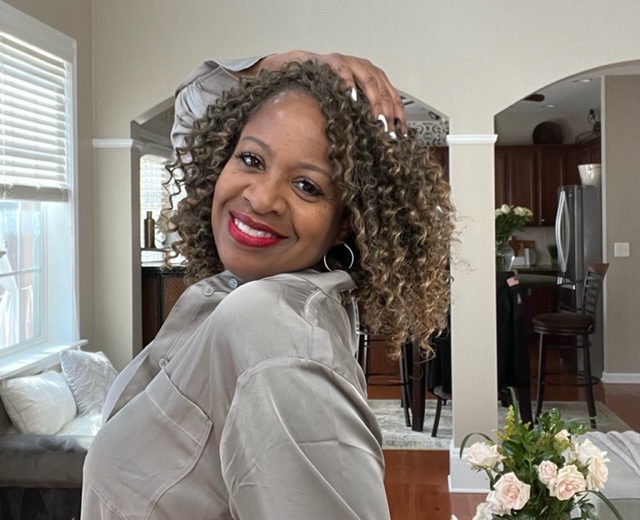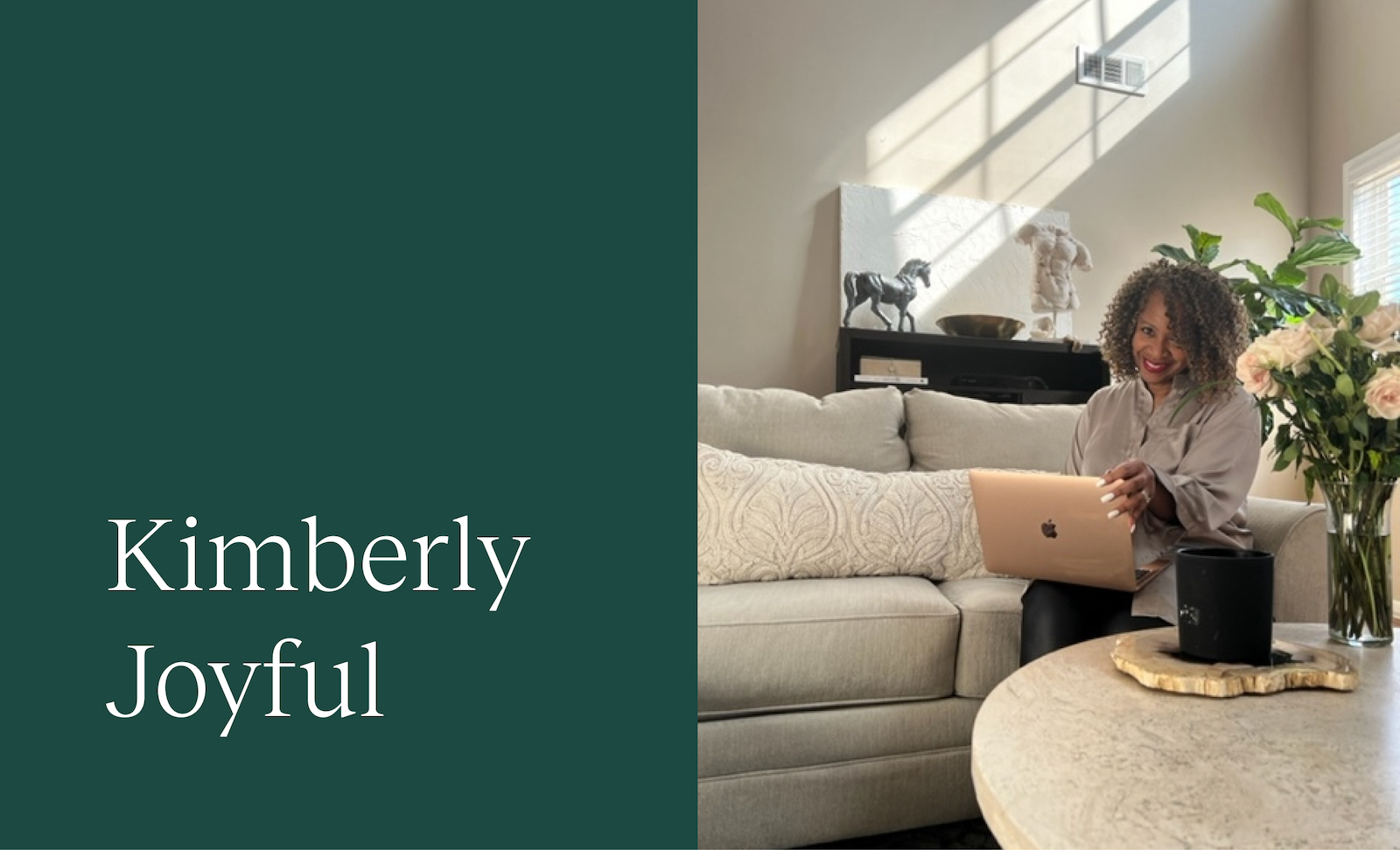You never know in life when you’ll come face to face with your calling. Kimberly Joyful of Paid For Your Say began 30 years ago. As a soon-to-be bride, she began looking for ways to bring in extra money leading up to her wedding day. Little did she know a focus group ad in an Atlanta newspaper, an affinity for pantyhose, and a willingness to find ways to bring in more cash would lead her to create a six-figure business teaching everyday people to get paid for their opinions.
Back to the beginning
Her first time participating in a pantyhose focus group—which paid about $40 an hour—was the starting point of cultivating a community of students looking to do the same.
When Kimberly first walked into the world of market research (including both mystery shopping and focus groups), it was uncharted territory that felt almost too good to be true. But after doing her research and seeing that brands are willing to pay to pick people’s brains in efforts to avoid costly mistakes later down the line, Kimberly saw an opportunity to build consistent income in an industry that’s rarely subjected to disruptions.
The possibilities have proven to be endless for participating in focus groups, according to Kimberly. She has had some fantastic opportunities, including test-driving cars and participating in a national commercial that garnered five-figures in residual income.
Identifying a need
After decades of participating in focus groups as a side hustle, Kimberly was nudged by those closest to her (who she taught over the years) to launch a course. She officially pulled the trigger in January 2020 and built her course right here on Teachable. Determined to take her decades of learning to the masses, Kimberly launched Paid For Your Say to give her students the tricks of the trade. Her goals was to help students bring in cash for sharing opinions on products they consume.

Today, Kimberly has students across the country and internationally ranging anywhere from 17 years old to 74 years old. A big reason why she decided to move forward with launching her course was that she saw there was potential for people from all walks of life to benefit from it. And her instincts were correct.
The power of networking and word of mouth
Much like many in January 2020, Kimberly never imagined that in just a few months of launching her Paid For Your Say course, a global pandemic would disrupt life as we all know it. But to Kimberly’s surprise, this did wonder for her business growth. She found folks were spending more time at home and searching for ways to bring in extra money in a volatile economy. In response to those looking to secure additional income, Kimberly found herself networking and using tools like Instagram Live to connect with people and put her course on the map.
Kimberly admits to not being the most active or savvy with social media. However, she captured the attention of folks who had the social media presence she lacked. And they’ve acted as real-life affiliates and advocates, of course. In fact, during the pandemic, Kimberly saw her signups and earnings increase tenfold from 2020 to 2021. She attributes this success to co-hosting a live with a friend and influencer, who had benefited from her teachings over the years. Kimberly even appeared on her daughter’s Youtube channel, which has over 250K subscribers.
Family values
For many Black creators entering the creator economy, the goal is to use entrepreneurship as a tool to break generational curses such as a lack of generational wealth. During the process of building a business while managing a full-time career, Kimberly’s children naturally picked up on her entrepreneurial spirit. Kimberly’s son directly followed in her footsteps, teaching people how to get paid market research opportunities. At the same time, her daughter took a different route and launched a successful YouTube channel.
“When I was married to their father, I was a stay-at-home mom, which I loved,” Kimberly says. “I don’t regret a day of it. But I would always be doing something; whether it was focus groups or mystery shopping. They always saw me doing something. When I got divorced, I became a real estate agent. So I was working for myself and doing focus groups. Both of my children are very creative. I can’t see either one of them ever working for anyone. They’re marching to the beat of their own drum.”
Never underestimate the value of your offering
Kimberly has students who now bring in thousands of dollars monthly thanks to her course. But additionally, Kimberly is proud that her students leave with transferable skills they can bring into various areas of their lives. Particularly her older students who are getting more familiar with technology such as Zoom reap these benefits.
“If it’s something you’re passionate about and have a lot of knowledge [of], there’s going to be someone else that wants to learn that,” she shares. “I knew that other people valued [participating in focus groups] because I was always helping people—telling them what to do and how to get into groups.”
Although it’s a niche topic, it’s really has changed some people’s lives, says Kimberly. She even notes some are making four and five thousand a month.
“If it’s something you’re really good at, there will be someone else who wants that knowledge. So go for it because having online courses is the way to go,” she adds.
Getting social
While Kimberly admits that social media isn’t her area of expertise nor where she spends the most time promoting her course, she realizes its untapped potential as far as scaling her business is concerned. Her immediate goals for growing her business include hiring a social media manager and virtual assistant. As an advocate of word-of-mouth marketing, Kimberly also wishes to launch an official affiliate program for her course. Luckily for Kimberly and other Teachable creators, we have the tools to help with the Teachable’s School Affiliates.
Connecting and paying it forward
There are frequent conversations in the creator community regarding Black Creators feeling their content is routinely suppressed by different platforms and generally not being compensated fairly compared to other groups when collaborating with brands. Kimberly shares her advice to marginalized creators who may feel discouraged.
“I encourage Black creators to share information and resources,” she says. “We can make more and negotiate more effectively if we share how much money we make for projects and sponsorships. It shouldn’t be a secret, as it helps us all the more information and ammunition we have. Don’t lowball yourself. Know your worth. And if we all do the same, we will be paid much more fairly.”
She adds, “For me, what has been powerful and profitable is collaborating with other Black creators. I specifically look to collaborate with and hire Black creators [and] professionals with the same drive, level of professionalism, and passion as I have. We can accomplish what we desire and dream of by looking within our own community. “
Simply put: Kimberly is transforming lives with her course—and you can do the same.
Join more than 150,000 creators who use Teachable to make a real impact and earn a real income.


